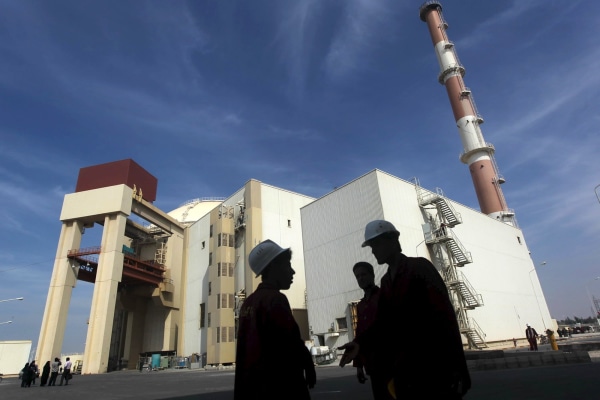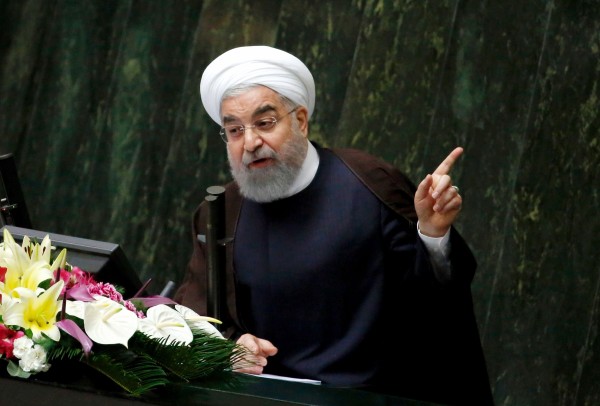Trump Administration Plans New Sanctions Against Iran
WASHINGTON — The Trump administration plans to announce new sanctions against Iran as soon as Thursday while also taking steps to preserve the 2015 nuclear deal with Tehran for now by extending the sanctions relief in the accord, senior administration officials familiar with the matter said.
The moves come in advance of President Donald Trump’s first appearance at the United Nations General Assembly next week.
Trump plans to sign off on a new Iran policy in advance of the gathering of world leaders, but officials said he is delaying a final decision on pulling out of the 2015 deal to curtail Iran’s nuclear program, known as the Joint Comprehensive Plan of Action (JCPOA), while exploring options for renegotiating key elements. The deadline for his decision is mid-October. Among other steps the president is seriously considering as he seeks to take a more aggressive approach to Iran is labeling Iran’s Revolutionary Guard a terrorist organization, a senior administration official said.
The new sanctions are aimed at entities and individuals tied to activities like procurement and human rights abuses, two senior administration officials and a person involved in the discussions told NBC News.

President Trump told reporters on Air Force One Thursday that he will announce a decision on the Iran nuke deal in October, but criticized it. “The Iran deal is one of the worst deals I have ever seen,” he said, adding that Iran is violating “the spirit” of the agreement and the U.S. is “not going to stand for what they are doing.”
Secretary of State Rex Tillerson said Thursday that President Trump “has made clear to those of us who are helping him develop this policy that we must take into account the totality of Iranian threats, not just Iran’s nuclear capabilities.”
Iran’s foreign minister pushed back against the Trump administration’s plans on Twitter. “The #JCPOA is not (re)negotiable,” said Javad Zarif. “A ‘better deal’ is pure fantasy. About time for U.S. to stop spinning and begin complying, just like Iran.”
The sanctions relief announcement coincides with a vote on a national defense bill Thursday, which will authorize the president to waive sanctions if he determines that it is “vital to the national security interests of the United States.”
Separately, the new sanctions are part of a broader plan by the administration to clamp down on the Iranian regime ahead of the rollout of its official Iran policy. Though the policy is largely complete, officials say there is still disagreement over whether the president should withhold re-certification of the Iran nuclear deal when it comes up for review in mid-October, and over how to address aviation licenses, including the one for Iran Air, Iran’s national carrier.
Sanctions against Iran Air and four other commercial and cargo carriers were lifted in January 2016 following implementation of the nuclear agreement. The agreement also allowed Iran to purchase commercial aircraft in bulk from Airbus, Boeing and a number of other companies.
Despite the Trump administration’s continued criticism of the Iran nuclear deal, it has not taken any measures thus far to curb those aircraft sales. However, the House adopted measures Wednesday to prevent the sale of commercial aircraft to Iran, despite concerns by some Democrats that such a move undermines the nuclear agreement.
Trump has publicly contemplated withholding certification of the JCPOA, regardless of whether Iran changes its course or not. Officials say there is currently vigorous debate among Trump’s top advisers over whether the president should recertify, and if he doesn’t, what that would look like.

The administration specifically wants to renegotiate the sunset clause in the nuclear deal that has it expiring 10 years after going into effect, the provisions on inspections — the U.S. wants them to be more stringent and to expand access to Iran’s military sites — and to curtail Iran’s ballistic missile program, two senior administration officials and a person familiar with the ongoing policy discussions said.
But to do so, the U.S. needs other countries involved in the deal, which include China, France, the U.K., Russia and Germany, to be on board. The U.S. believes France and the U.K. are open to taking steps to try to compel Iran to renegotiate the nuclear deal, though Germany has not been receptive, officials said.
“The Europeans have to be with us,” a senior administration official said.
The officials say the nearly completed Iran policy addresses the need to dismantle Iranian influence in countries across the Middle East (which includes strengthened alliances with Sunni Muslim countries across the region). The policy also calls for an increased crackdown in the military activities of the Iranian Revolutionary Guard Corps, and strengthened ties with pro-democratic groups in Iran.
The sanctions are designed to set the stage for Trump’s appearance next week at the U.N. The issue will be a focus of the president’s first speech at the General Assembly, two officials said. It will also feature prominently in his meeting Monday with Israeli Prime Minister Benjamin Netanyahu in New York on the sidelines of the General Assembly.
Trump’s speech to the UN General Assembly on Tuesday is expected to include some tough talk against Tehran, one of the officials said. Iran’s President Hassan Rouhani is expected to attend the general assembly but it is unclear whether he will be present for Trump’s speech.
The official also says that Trump will call on European allies — in public and private — to take a harsher, more disciplinary approach to engaging with Iran. After JCPOA was signed, many European countries quickly seized the opportunity to capitalize on Iranian business opportunities, a move that prompted concern even some in the Obama administration.
Trump and his advisers plan to urge European allies to distance themselves from Iran until it corrects some of the issues this administration views as “fatal flaws” — a request that is being met by mixed enthusiasm among European leaders.
Trump will work to appeal to those allies through the need to cap Iranian support of radical fighters in countries like Syria, which are posing an increasing security threat to countries across Europe.
Source: https://www.nbcnews.com/news/mideast/trump-team-plans-new-sanctions-against-iran-n801286